News
Harvard College Engineers Without Borders President Peter Jin with Mkutani elementary school students. (Photo provided by Peter Jin.)
With crumbling concrete walls and fractured floors, the low, beige building standing near the center of Mkutani is not much to look at. But for the children who call this Tanzanian village home, the community’s sole elementary school provides their best opportunity to overcome the crushing poverty of this remote region.
By building them a better school, a team of Harvard students hopes to help these Tanzanian children have better lives.
The Harvard students, members of the University’s chapter of Engineers Without Borders – USA (EWB), have launched a long-term project to improve the building so that it better meets the needs of this growing community. To kick off the project, several John A. Paulson Engineering and Applied Sciences students embarked on an assessment trip to the village in May and June.
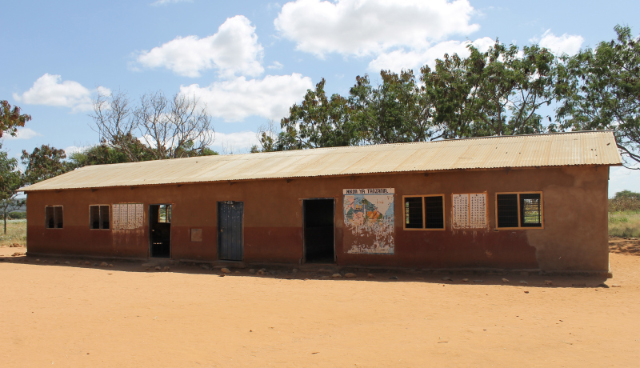
The Mkutani schoolhouse has only four classrooms for 500 students. (Photo by Peter Jin.)
Mkutani is located in one of the poorest regions of this east African nation, about two hours from the capital, Dodoma. Most residents are cattle or goat herders who eke out a meager existence from the arid land.
In Tanzania, education beyond elementary school is available only to children who pass a national exam in the seventh grade. No child from the village passed the exam last year. The dilapidated school presents the biggest obstacle to the Mkutani students’ success—more than 500 schoolchildren are packed into four small, stark classrooms.
“A lot of classes must be held outside, rain or shine, so this creates a very disruptive learning environment,” said EWB chapter president Peter Jin, A.B. ’18, an applied math and economics concentrator. “These students are actively trying to receive an education—everyone in the village sees the value in it—they just don’t have the resources they need."
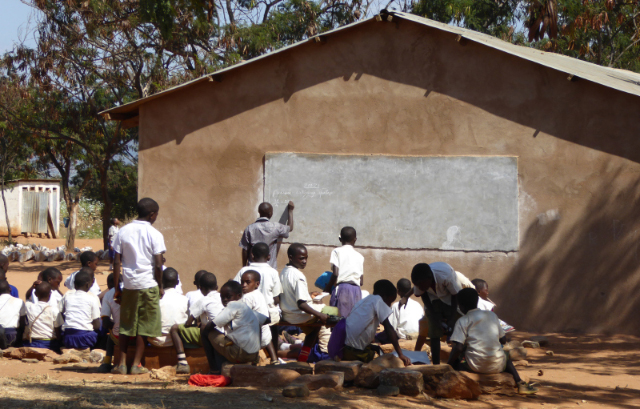
A group of Mkutani students attend class outside. (Photo by Christopher Lombardo.)
The Harvard students are collaborating on this project with the Boston professional chapter of EWB; the Boston chapter has worked in this village since 2014. During their recent trip, the students took stock of the existing infrastructure, identified sources of building materials, met with local leaders and villagers, and brainstormed feasible and affordable solutions. The professionals provided advice and feedback.
While plans for the building are still under development, the students’ initial ideas involve a refurbishment of the current schoolhouse as well as construction of four additional classrooms and five teacher residences. Jin explained that in Tanzania it is traditional for teachers to live onsite at the school, but the current teacher housing has crumbled beyond repair. Teachers are forced to commute long distances over rough terrain, which cuts into instructional time.
The students also plan to incorporate a water source and upgraded latrine facilities into the project, which could make it easier for female students to regularly attend school. From a very young age, girls are responsible for gathering well water for their families, but since there is no water supply near the homes or the school, they must walk long distances after school ends each day, said project lead Lindiwe Makgalemele, A.B. ’18, a biomedical engineering concentrator.
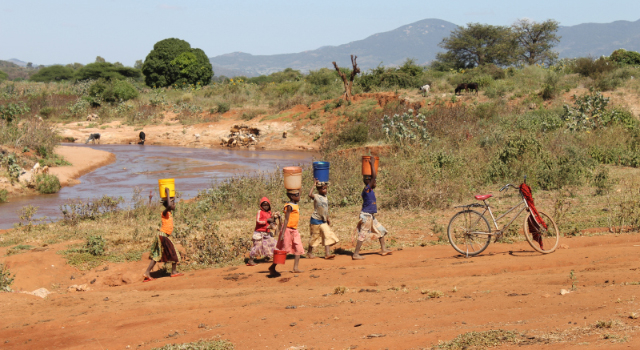
A group of young children in Mkutani carry water back to their homes. (Photo by Peter Jin.)
Makgalemele, a native South African, learned about these challenges and the impacts of women’s health issues on education during a meeting with the village’s female residents. The principal asked Makgalemele to encourage the schoolgirls to keep up with their studies as they approach their seventh grade exam. However, inadequate access to clean latrines and feminine hygiene products keeps the girls away from school, which impacts their studies, she said.
“Our hope is that we are not only building structures, but creating effective spaces of learning that consider these challenges. Hopefully, this will help the school in some way reach a turning point in its performance,” Makgalemele said. “The community members were so gracious and so enthusiastic about the collaboration and what it can mean for their children. I’m confident that, working together, we’ll be able to do something meaningful”
The Harvard students will spend the academic year fine-tuning the design and fundraising for the project. The villagers are responsible for providing 5 percent of the project cost and also supplying labor for construction. The team’s goal is to return to Tanzania next summer to build the first pair of classrooms and latrine facilities.
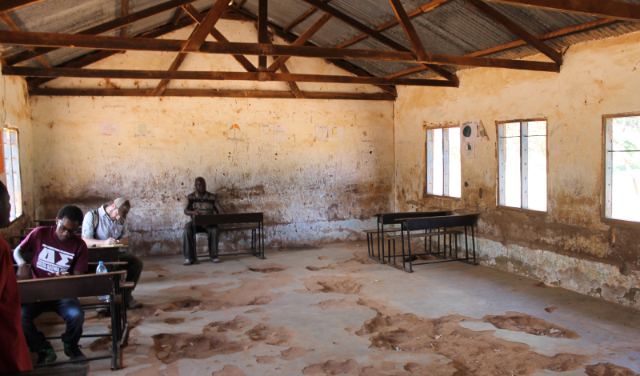
The cracked floors and crumbling walls of the Mkutani elementary classrooms make the space difficult for students to use. (Photo by Peter Jin.)
This marks the first time the Harvard chapter has collaborated on a project with the Boston professional chapter, said club advisor Christopher Lombardo, Associate Director for Undergraduate Studies in Electrical and Mechanical Engineering. EWB typically takes on only one international project at a time, but the organization has seen such dramatic membership growth over the past four years that they launched a second, concurrent project. EWB students are also working to provide the village of Los Sanchez in the Dominican Republic with reliable access to clean drinking water.
Undertaking a physical construction project in Tanzania not only broadens the geographic reach of the club, but also enables the students to develop a different set of engineering skills, Lombardo said. Mentors from the Boston Professional EWB chapter will work closely with the students in Cambridge and Tanzania as they finalize their plans and begin implementation.
“By working closely with the Boston chapter on this project, students will have much more exposure to professional engineering practices and will be able to get a better sense of what these professionals do, day to day,” he said. “In addition to mentorship, this project offers students a unique opportunity to use their skills and training to make a global impact.”
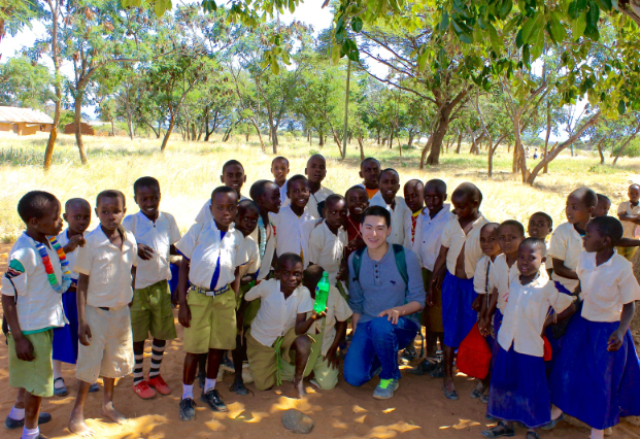
Engineers Without Borders President Peter Jin with a group of Mkutani elementary school students. (Photo provided by Peter Jin.)
Topics: Student Organizations
Cutting-edge science delivered direct to your inbox.
Join the Harvard SEAS mailing list.
Press Contact
Adam Zewe | 617-496-5878 | azewe@seas.harvard.edu



